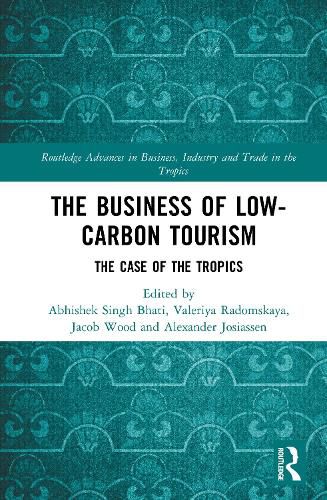Readings Newsletter
Become a Readings Member to make your shopping experience even easier.
Sign in or sign up for free!
You’re not far away from qualifying for FREE standard shipping within Australia
You’ve qualified for FREE standard shipping within Australia
The cart is loading…






The millions of tourists who visit tropical nations annually underscore the region's significance in global tourism. However, these nations receive little scholarly attention compared to major countries. This book fills that gap, presenting a unique, in-depth exploration of the pressing transformations and shared sustainability challenges faced by nations and territories in the Tropics, providing valuable insights and solutions for low-carbon tourism development, and offering a novel attempt to progress the responsible tourism agenda.
The book contributes to the emerging field of low carbon tourism. It concentrates on tourism-intensive tropical countries, exploring nation-specific and regional measures that could encourage low-carbon operations within the tourism sector. It focuses on distinct populations, host communities and service providers in the Tropics, distinguishing it from most texts on sustainability and low-carbon tourism that either focus on Western perspectives or strive for universal applicability. The chapters place the discussion within a contemporary context and introduce the challenges this era holds, including the role of marketing, policies and regulations, innovation, social norms and values in promoting low-carbon transition in tourism. Topics covered in this book include, but are not limited to, low-impact visitor behavior and low-carbon planning; voluntary, nudged, or compulsory participation in emission reduction initiatives; infrastructural, social, and psychological barriers to change; greenwashing and responsible marketing; ethnocentrism, and the politics of low-carbon tourism.
Targeted primarily at academics and professionals in tourism, business, environmental management, policy studies, and public administration, this practical and insightful book is essential reading for anyone interested in low-carbon tourism development and the challenges that lie ahead.
$9.00 standard shipping within Australia
FREE standard shipping within Australia for orders over $100.00
Express & International shipping calculated at checkout
The millions of tourists who visit tropical nations annually underscore the region's significance in global tourism. However, these nations receive little scholarly attention compared to major countries. This book fills that gap, presenting a unique, in-depth exploration of the pressing transformations and shared sustainability challenges faced by nations and territories in the Tropics, providing valuable insights and solutions for low-carbon tourism development, and offering a novel attempt to progress the responsible tourism agenda.
The book contributes to the emerging field of low carbon tourism. It concentrates on tourism-intensive tropical countries, exploring nation-specific and regional measures that could encourage low-carbon operations within the tourism sector. It focuses on distinct populations, host communities and service providers in the Tropics, distinguishing it from most texts on sustainability and low-carbon tourism that either focus on Western perspectives or strive for universal applicability. The chapters place the discussion within a contemporary context and introduce the challenges this era holds, including the role of marketing, policies and regulations, innovation, social norms and values in promoting low-carbon transition in tourism. Topics covered in this book include, but are not limited to, low-impact visitor behavior and low-carbon planning; voluntary, nudged, or compulsory participation in emission reduction initiatives; infrastructural, social, and psychological barriers to change; greenwashing and responsible marketing; ethnocentrism, and the politics of low-carbon tourism.
Targeted primarily at academics and professionals in tourism, business, environmental management, policy studies, and public administration, this practical and insightful book is essential reading for anyone interested in low-carbon tourism development and the challenges that lie ahead.